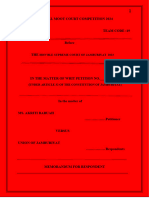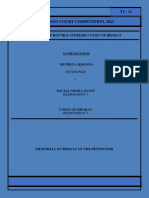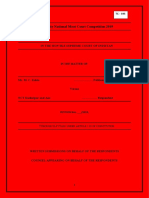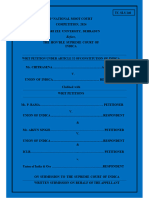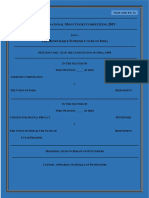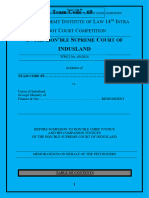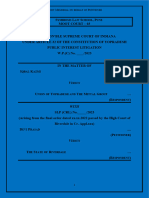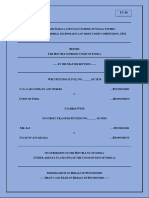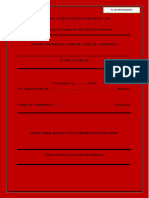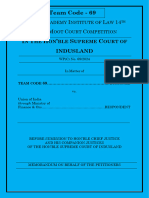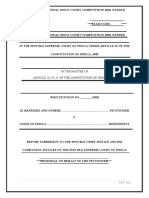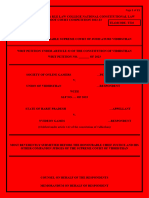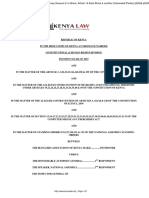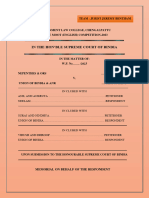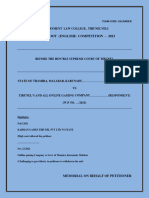Ramaiah Institute of Legal Studies 1 ST National Moot Court Competition, 2023
Ramaiah Institute of Legal Studies 1 ST National Moot Court Competition, 2023
Uploaded by
superman1996femaleCopyright:
Available Formats
Ramaiah Institute of Legal Studies 1 ST National Moot Court Competition, 2023
Ramaiah Institute of Legal Studies 1 ST National Moot Court Competition, 2023
Uploaded by
superman1996femaleOriginal Description:
Original Title
Copyright
Available Formats
Share this document
Did you find this document useful?
Is this content inappropriate?
Copyright:
Available Formats
Ramaiah Institute of Legal Studies 1 ST National Moot Court Competition, 2023
Ramaiah Institute of Legal Studies 1 ST National Moot Court Competition, 2023
Uploaded by
superman1996femaleCopyright:
Available Formats
TEAM CODE: NM16
RAMAIAH INSTITUTE OF LEGAL STUDIES
1 ST NATIONAL MOOT COURT COMPETITION, 2023
BEFORE THE HON’BLE BENCH OF SUPREME COURT JUDGE, AMESTRIS
IN THE MATTER OF:
(PETITIONER) (RESPONDENT)
NAOMI NAKAMORA VS. UNION OF AMESTRIS
APPEAL NO.______/ 2023
FILE PETITION UNDER,
ARTICLE 13(1),19(1)A, 14, 21
THE CONSTITUION OF AMESTRIS
UPON SUBMISSION TO THE HON’BLE SUPREME COURT JUDGE.
MEMORIAL ON BEHALF OF RESPONDENT
RILS , 1ST NATIONAL MOOT COURT COMPETITION2023
INDEX
LIST OF ABBREVIATIONS……………………….………………….…..…………..04
INDEX OF AUTHORTIES…………………………………………………………05 to 06
a) TABLE OF CASES……...………………….…………………………… 05
b) BOOKS…………………...…………………………………………………….06
c) STATUTES…………...………………….………………………………..…06
d) DATABASE….………………………………...……………………………….....06
STATEMENT OF JURISDICTION………………………………………………….07
STATEMENT OF FACTS…………………………………………………………..08 to 09
ISSUES RAISED………………………………………………………………………..10
SUMMARY OF ARGUMENTS…………………….……………………………….11 to 12
ARGUMENTS ADVANCED………………………………………………………...13 to28
ISSUES: 1.0 WHETHER THE RESTRICTION IMPOSED ON THE APP IS VIOLATION OF
NAOMI’S RIGHT TO LIVEHOOD?................................................13 to 18
1.1 IN THE VIEW OF LIFE OF NAOMI?
1.2 WHAT WOULD BE THE REACTION OF AMESTRIANS FOR
BANNING THE APP?
1.3 PERUSAL OF ARTICLE 21 IN AMESTRIS?
ISSUES: 2.0 WHETHER RULE 3 TO 7 OF INFORMATION TECHONOLOGY
(INTERMEDIARY GUIDELINES AND DIGITAL MEDIA ETHICS CODE) RULES, 2021
ARE UNCONSTITUTIONAL?.................................................................17 to 21
2.1 DOES RULE 3 TO 7 OF IT RULES, 2021 APPLIES TO THE APP?
2.2 THE CLAIMING OF THESE POWER IS VOILATE ARTICLE 14,19
AND 21 OF AMESTRIS CONSTITUTION?
2.3 THE FILTERATION AND WOMENES DEROGATORY:
2.4 WHETHER THE RULES,2021 IS CONSIDERED AS
UNCONSTITUTIONAL?
MEMORANDUM ON BEHALF OF RESPONDENT Page 2
RILS , 1ST NATIONAL MOOT COURT COMPETITION2023
ISSUES: 3.0 WHETHER THE HIGH COURT OF KIRITO WAS RIGHT IN DECIDING
THAT “ANY LAW THAT CATERS TO THE PROTECTION OF WOMEN AND
CHILDERN IS A GOOD LAW?”........................................................22 to 28
3.1 WHETHER THE WRIT PETITION IS FILED BY NAOMI IS VALID?
3.2 DOES THE APP HAD DEPRIVED HER RIGHT UNDER ARTICLE 21?
3.3 WHETHER THE HIGH COURT HAVE RIGHT TO DECIDE?
3.4 DOES BANNING THE APP IS THS ONLY THE WAY TO PROTECT
THE WOMEN AND CHILDERN?
PRAYER……………………………………………………………………………………29
MEMORANDUM ON BEHALF OF RESPONDENT Page 3
RILS , 1ST NATIONAL MOOT COURT COMPETITION2023
LIST OF ABBRIVATION
SEC. Section/Sections
A.I.R. All India Reporter
SCC Supreme Court Cases
IT Information Technology
HC High Court
Govt. Government
Hon‘ble Honourable
App Application
Art Article
OTT Over the top
Ors. Others
MEMORANDUM ON BEHALF OF RESPONDENT Page 4
RILS , 1ST NATIONAL MOOT COURT COMPETITION2023
INDEX OF AUTHORITIES
~TABLE OF CASES~
1) M. J. Sivani v. State of Karnataka & Ors,
2) Chameli Singh v. State of Uttar Pradesh,
3) A.K. Gopalan v. State of Madras
4) Express Newspapers v. Union Of India (AIR 1958 SC 578)
5) Prabha Dutt v. Union Of India (1982) 1 SCC 1.
6) State of Maharashtra v BasantibaiMohanLalKhetan[1986] SCR (1) 707
7) Sodan Singh v New Delhi Municipal Committee (1989) 4 SCC 155
8) State of Maharashtra v BasantibaiMohanLalKhetan[1986] SCR (1) 707
9) Bombay Hawkers' Union And Ors v Bombay Municipal Corporation (2017) SCC Bom
1976
10) M.J.Sivani&Ors.v. State of Karnataka &Ors.[1995] 1995 (3) SCR 329
11) Prajwala v. Union of India & Others Non-Governmental Organization (2018),
12) State of Bombay vs R.M.D.C[AIR 1957 SC 699].
13) State of Madhya Pradesh vs Rakesh Kohli( AIR 2012 SC 2351)
14) WhatsApp vs. Union of India (2021)
15) Siddharam Satlingappa Mhetre v. State of Maharastra JT 2010 (13) SC 247: (2010) 12
SCALE 691
16) Suchita Srivastava v. Chandigarh Administration AIR 2010 SC 235
17) Francis Coralie v. Union Territory of Delhi, AIR 1981 SC 74
18) Union for Civil Liberties v. Union Of India, AIR 1997 SC 568
19) Indian Council for Enviro-Legal Action v. Union Of India, 1996 3 SCC 212
20) J.P Unnikrishnan v. State of Andhra Pradesh, AIR 1993 SC 2178.,
21) Kadra Pahadia v. State Of Bihar, AIR 1981 SC 939
22) Vishaka v. State of Rajasthan 1997 6 SCC 241
23) Sakshi v. Union of India (1999) 6 SCC 591
MEMORANDUM ON BEHALF OF RESPONDENT Page 5
RILS , 1ST NATIONAL MOOT COURT COMPETITION2023
~STATUTES ~
1) Information Technology (Intermediary Guidelines and Digital Media Ethics
Code) Rules, 2021Code of Criminal Procedure , 1973.
2) Constitution of Amestris , 1949.
3) Information Technology Act, 2000.
~BOOKS~
1) M P Jain Indian Constitutional Law edition 2018.
2) Constitutional law of India Dr. J.N. Pandey Edition: 2020
3) Constitution of India 2021 Author: VN Shukla
4) Information Technology (Intermediary Guidelines and Digital Media Ethics
Code) Rules, 2021.( Bare acts )
~DATABASE~
1) Indiankanoon.org/
2) lexforti.com
3) casemine.com
4) livelaw.in
5) ipleaders.in
MEMORANDUM ON BEHALF OF RESPONDENT Page 6
RILS , 1ST NATIONAL MOOT COURT COMPETITION2023
STATEMENT OF JURISDICTION
The Hon‘ble Supreme Court of Amestris has the jurisdiction in this matter under Art.136 of
the Constitution of Amestris which reads as follows:
ARTICLE -136. Special leave to appeal by the Supreme Court
(1) Notwithstanding anything in this Chapter, the Supreme Court may, in its discretion,
grant special leave to appeal from any judgment, decree, determination, sentence or
order in any cause or matter passed or made by any court or tribunal in the territory of
India.
(2) Nothing in clause (1) shall apply to any judgment, determination, and sentence or
order passed or made by any court or tribunal constituted by or under any law relating
to the Armed Forces.
The present memorandum sets forth the facts, contentions and arguments in the present case.
MEMORANDUM ON BEHALF OF RESPONDENT Page 7
RILS , 1ST NATIONAL MOOT COURT COMPETITION2023
STATEMENT OF FACT
AMESTRIS AND KIRITO:
Amestris is a democratic republic and is one of the oldest civilizations in the world with a
kaleidoscopic variety and rich cultural heritage. Kirito is a State in the Amestris Union. Social
media is very commonly used and has a high influence on all citizens of Amestris and also a
source of income. Kirito has seen the rise of many social media influencers, especially since
the onset of the COVID-19 pandemic.
INCREASE IN SOCIAL MEDIA:
Over the last five years many social media influencers have come up in Amestris and Kirito has
seen the rise of most of these influencers. Many young adults and teenagers have started making
posts and videos which are also serving as a source of income for them. Due to this, the quality
of life of many citizens in Kirito has increased greatly and has also led to a boost in the economy
of Amestris.
ENTERING OF VETUBE IN AMESTRIS:
VeTube App is a leading social media platform with its headquarters in Numbani, Wakanda
that allows netizens to make vlogs and other videos and post them which is then available to
watch, all around the globe. VeTube entered the Amestris market in the year 2018 and was
welcomed with open arms in the country. The app became a huge hit and was very popular
among Amestrians. Vlogging is the most common use of VeTube.
VETUBE and NAOMI:
Naomi, a 20-year-old woman, was an active user and vlogs on the VeTube app every day. She
repurposed waste into art through various creative methods in her videos and motivated netizens
to "reuse and recycle." Due to the popularity of her videos, she started a new, separate channel,
"Recycle With Naomi. Naomi used to make around Rs. 70,000 to 1,00,000 every month from
her VeTube revenue. This was also the main source of income for her family.
MEMORANDUM ON BEHALF OF RESPONDENT Page 8
RILS , 1ST NATIONAL MOOT COURT COMPETITION2023
IT RULES, 2021:
On 25-02-2021, the Ministry of Information and Broadcasting along with the Ministry of
Electronics and Information Technology of the Government of Amestris published the
Information Technology (Intermediary Guidelines and Digital Media Ethics Code) Rules, 2021,
a secondary or subordinate legislation that suppressed Amestris Intermediary Guidelines Rules
2011. On account of the new Rules, social media and OTT platforms were given time to make
the necessary implementations.
BANNING OF VETUBE
Amestris Times, a famous news channel in Kirito had an exclusive news report that stated that
the VeTube App had not implemented the new Information Technology Rules, 2021, failed to
appoint a Chief Compliance Officer, resident in Amestris and had violated under Rules,
2021.VeTube App was thus banned in Amestris and none of the Amestrial citizens were able
to open or even access the app.
WRIT IN KIRITO HIGH COURT:
Devastated by this, Naomi filed a writ at the Kirito High Court challenging the ban imposed on
the VeTube ap by the Government of Amestris. She also contended that Rules 3 to 7 of the IT
Rules, 2021 gave intermediaries "sweeping powers".She claimed that these powers were clear
violation of users' rights including the rights under Article 14, 19 and 21.
JUDGEMENT OF KIRITO HIGH COURT:
The Government of Amestris was of the opinion that the IT Rules did not violate any rights of
individuals and were merely setting down guidelines for the regulation of OTT and Social
media platforms and give special emphasis on the protection of women and children from
sexual offences on social media. The Government of Amestris also stated that VeTube had no
filtering of content. The Hon'ble High Court of Kirito decided on the matter and gave the
judgement stating that the Government did not violate any rights of the citizens by imposing a
ban on the VeTub app and was merely trying to protect the citizens of Amestris from unwanted
and sensitive content. The court also stated that the new I Rules, 2021 was indeed a
revolutionary step in the field of digital media law and stated that any action or law that caters
to the protection of women and children is a "good law.
MEMORANDUM ON BEHALF OF RESPONDENT Page 9
RILS , 1ST NATIONAL MOOT COURT COMPETITION2023
ISSUES RAISED
~ISSUES 1.0~
WHETHER THE RESTICDTION IMPOSED ON THE APP IS VOILATION OF NAOMI’S
RIGHT TO LIVEHOOD?
~ISSUES 2.0~
WHETHER RULE 3 TO 7 OF INFORMATION TECHONOLOGY (INTERMEDIARY
GUIDELINES AND DIGITAL MEDIA ETHICS CODE) RULES, 2021 ARE
UNCONSTITUTIONAL?
~ISSUES 3.0~
WHETHER THE HIGH COURT OF KIRITO WAS RIGHT IN DECIDING THAT “ANY
LAW THAT CATERS TO THE PROTECTION OF WOMEN AND CHILDERN IS A GOOD
LAW?”
MEMORANDUM ON BEHALF OF RESPONDENT Page 10
RILS , 1ST NATIONAL MOOT COURT COMPETITION2023
SUMMARY OF ARGUMENTS
ISSUE 1.0 WHETHER THE RESTICDTION IMPOSED ON THE APP IS VOILATION OF
NAOMI’S RIGHT TO LIVEHOOD?
• Naomi has approached the court that violation of her fundamental right under article 21,
19(1)(a) of the constitution of the Amestris. Reasonable Restriction/ Limitation on
Fundamental Right: All over the world even the historical deep-rooted democracy there
are limitations imposed on the enjoyment of the fundamental right. Article 19 of the Indian
constitution says these rights are conditional and subjected to reasonable restriction, such
reasonable restriction is stipulated in Article 19 of the Indian Constitution, while for others
such limitations are added up either amendment Act or the supreme court’s verdict.
• For Instances Reasonable Restriction given in Article 19 of the Indian Constitution, are
extended to Article 21 as well as in the “Meneka Gandhi Case” verdict by the Supreme
Court in 1978, Article 15 and Article 16 of the Indian Constitution have also been amended
by the parliament in pursuit of social justice.
ISSUE 2.0 WHETHER RULE 3 TO 7 OF INFORMATION TECHONOLOGY
(INTERMEDIARY GUIDELINES AND DIGITAL MEDIA ETHICS CODE) RULES, 2021
ARE UNCONSTITUTIONAL?
• The Government of Amestris was of the opinion that the IT Rules did not violate any rights
of individuals and were merely setting down guidelines for the regulation of OTT and
Social media platforms. The Government contended that the Rules aim to provide a robust
complaint mechanism for the users of social media and over-the-top (OTT) platforms to
address their grievances and give special emphasis on the protection of women and
children from sexual offences on social media and made sure that online content publishers
and social media intermediaries follow the Constitution of the country and subject
themselves to domestic laws, such as the Cinematograph Act, 1952.
MEMORANDUM ON BEHALF OF RESPONDENT Page 11
RILS , 1ST NATIONAL MOOT COURT COMPETITION2023
• Territorial jurisdiction, According to Article 245 of the Indian constitution –“Extent of
laws made by Parliament and by the Legislatures of States-
ISSUE 3.0 WHETHER THE HIGH COURT OF KIRITO WAS RIGHT IN DECIDING THAT
“ANY LAW THAT CATERS TO THE PROTECTION OF WOMEN AND CHILDERN IS
A GOOD LAW?”
• The powers of the legislature under Article 245 for the enactment of laws is an absolute
power which is subject only to its legislative competence as well as the other constitutional
limitations. Hence, he powers which is required to make a law includes the power to give
an effect to it prospectively as well as retrospectively.
• “The statute which is enacted by the parliament or any of the state legislatures cannot be
declared unconstitutional first stop the coat should be able to hold beyond any iota of doubt
that the violation of the constitutional
MEMORANDUM ON BEHALF OF RESPONDENT Page 12
RILS , 1ST NATIONAL MOOT COURT COMPETITION2023
ADVANCE ARGUMENTS
ISSUE 1.0 WHETHER THE RESTICDTION IMPOSED ON THE APP IS VOILATION OF
NAOMI’S RIGHT TO LIVEHOOD?
It is humbly submit before this hon’ble court that the restriction impose on the app is not
violation of Naomis right to livelihood, the law (rules) have been enforced with certain
reasonability. What ever the act passes or enforced with good conscience of the people
especially for the protection of women and children. Here the Naomi has approached the court
to breach of her fundamental right, by banning the app have not see this like some person to
make law to likely to have more protection and implementation of the future child and
women’s.
1.1 IN THE VIEW OF LIFE OF NAOMI?
Naomi, a 20-year-old woman, was an active user of VeTube and made vlogs on the VeTube
app every day. She repurposed waste into art through various creative methods in her videos
and motivated netizens to “reuse and recycle.” Due to the popularity of her videos, she started
a new, separate channel, “Recycle With Naomi.”
Naomi used to make around Rs. 70,000 to 1,00,000 every month from her VeTube revenue.
This was also the main source of income for her family. She had not only developed a steady
revenue stream, securing their family’s financial future, but her DIY ideas also inspired many
of her viewers to start their own small businesses.
“The state may not by affirmative action, be compelled to provide adequate means of livelihood
or work to the citizens. But any person who is deprived of his right to livelihood except
according to the just and fair procedure established by law can challenge the deprivation as
offending the right to life conferred in Article 21.”
1.2 WHAT WOULD BE THE REACTION OF AMESTRIANS FOR BANNING THE
APP?
On 25-02-2021, the Ministry of Information and Broadcasting along with the Ministry of
Electronics and Information Technology of the Government of Amestris published the
MEMORANDUM ON BEHALF OF RESPONDENT Page 13
RILS , 1ST NATIONAL MOOT COURT COMPETITION2023
Information Technology (Intermediary Guidelines and Digital Media Ethics Code) Rules,
2021, a secondary or subordinate legislation that suppressed Amestris’ Intermediary
Guidelines Rules 2011. The 2021 Rules have stemmed from Section 87 of the Information
Technology Act, 2000 and is a combination of the draft Intermediaries Rules, 2018 and the
OTT Regulation and Code of Ethics for Digital Media.
On account of the new Rules, social media and OTT platforms were given time up to 25th May,
2021 to make the necessary implementations.
On the 12th of July, 2021, Amestris Times, a famous news channel in Kirito, Amestris had an
exclusive news report that stated that the VeTube App had not implemented the new
Information Technology (Intermediary Guidelines and Digital Media Ethics Code) Rules,
2021. It was specifically stated that they failed to appoint a Chief Compliance Officer,
According to the rule of 3, 2021 resident in Amestris and had violated almost all the provisions
of the IT Rules, 2021.
On account of this news feature, the Government of Amestris after a thorough investigation,
provided VeTube, 3 months more to comply with the said IT Rules, 2021. However, on
November 12, 2021, the Government of Amestris noticed that VeTube had not taken any steps
to comply with the new IT Rules, 2021 But even the VeTube not considered by the
implementation so that the government pass the order towards the VeTube app as directed by
them and decided to completely terminate the use of the app within the territory of Amestris.
The right to livelihood but it also stated that the Constitution does not put an absolute embargo
on the deprivation of life or personal liberty. Such deprivation, however, must be according to
procedure established by law which must be fair, just, and reasonable.
1.3 PERUSAL OF ARTICLE 21 IN AMESTRIS?
Naomi has approached the court that violation of her fundamental right under article 21, 19(1)(a)
of the constitution of the Amestris. Reasonable Restriction and it not an absolute right.
Limitation on Fundamental Right: All over the world even the historical deep-rooted democracy
there are limitations imposed on the enjoyment of the fundamental right. Article 19 of the Indian
constitution says these rights are conditional and subjected to reasonable restriction, such
reasonable restriction is stipulated in Article 19 of the Indian Constitution, while for others such
limitations are added up either amendment Act or the supreme court’s verdict.
MEMORANDUM ON BEHALF OF RESPONDENT Page 14
RILS , 1ST NATIONAL MOOT COURT COMPETITION2023
For Instances Reasonable Restriction given in Article 19 of the Indian Constitution, are extended
to Article 21 as well as in the “Meneka Gandhi Case” verdict by the Supreme Court in 1978, Article
15 and Article 16 of the Indian Constitution have also been amended by the parliament in pursuit
of social justice.
In the Supreme Court held that right to life under Article 21 does protect livelihood but added
a rider that its deprivation cannot be extended too far or projected or stretched to the avocation,
business, or trade injurious to public interest or has insidious effect on public morals or public
order. It was, therefore, held that regulation of video games or prohibition of some video games
of pure chance or mixed chance and skill are not violative of Article 21 nor is the procedure
unreasonable, unfair, or unjust1.
In the SC held that the state acquired a landowner’s land following the procedure laid down in
the relevant law of acquisition. So even though the right to livelihood of the landowner is
adversely affected, it is not violated2.
The Court opined that the state acquires land in exercising its power of eminent domain for a
public purpose. The landowner is paid compensation in place of land. Therefore, the plea of
deprivation of the right to livelihood under Art. 21 is unsustainable. In observed "Man as
rational being desires to do many things, but in a civil society his desired have to be controlled,
regulated and reconciled with the exercise of similar desires by other individuals"3.
The act was passed to improve the service condition of workmen in the newspaper industry,
and therefore, impose reasonable restrictions on the rights guaranteed by Article 19(1) (a)4. The
court stated that "With great power comes great responsibility, therefore the freedom under
Article 19(1) (a) is correlative with the duty not to violate any law5.The use of the Internet and
social media has become very common in India owing to the availability of smart devices,
lower internet tariffs and global connectivity6.
The Constitution does not put an absolute embargo on the deprivation of life or personal liberty.
Furthermore, it was observed in another leading case that “Liberty of an individual comes to
1
M. J. Sivani v. State of Karnataka & Ors,
2
Chameli Singh v. State of Uttar Pradesh,
3
A.K. Gopalan v. State of Madras
4
Express Newspapers v. Union Of India (AIR 1958 SC 578)
5
Prabha Dutt v. Union Of India (1982) 1 SCC 1.
6
State of Maharashtra v BasantibaiMohanLalKhetan[1986] SCR (1) 707
MEMORANDUM ON BEHALF OF RESPONDENT Page 15
RILS , 1ST NATIONAL MOOT COURT COMPETITION2023
an end where the liberty of another commences”7. It is far too well settled to admit of any
argument that the procedure prescribed by law for the deprivation of the right conferred by
Article 21 must be fair, just, and reasonable8.
It was observed that no one has any right to do his or her trade or business so as to cause
nuisance, annoyance, or inconvenience to the other members of the public9.
The Naomi right not been infringed so that in reference to the case Court held that right to life
under Article 21 does protect livelihood but added a rider that its deprivation cannot be
extended too far or projected or stretched to the avocation, business or trade injurious to public
interest or has insidious effect on public moral or public order. It was, therefore, held that
regulation of video games or prohibition of some video games of pure chance or mixed chance
and skill are not violative of Article 21 nor is the procedure unreasonable, unfair, or unjust10.
a person is deprived of such a right according to the procedure established by law which must
be fair, just and reasonable and which is in the larger interest of people, the plea of deprivation
of the right to livelihood under Article 21 is unsustainable.
`certain limitations necessarily imposed upon a person in the enjoyment of their right
should not be an excessive nature or arbitrarily.`
Hence, it is humbly submitted before this hon’ble court that the restriction imposed on the app is
not a violation of Naomi’s right to livelihood , a person is deprived of such a right according to the
procedure established by law which must be fair, just and reasonable and which is in the larger
interest of people, the plea of deprivation of the right to livelihood under article 21 is unsustainable.
7
Sodan Singh v New Delhi Municipal Committee (1989) 4 SCC 155
8
State of Maharashtra v BasantibaiMohanLalKhetan[1986] SCR (1) 707
9
Bombay Hawkers' Union And Ors v Bombay Municipal Corporation (2017) SCC Bom 1976
10
M.J.Sivani&Ors.v. State of Karnataka &Ors.[1995] 1995 (3) SCR 329
MEMORANDUM ON BEHALF OF RESPONDENT Page 16
RILS , 1ST NATIONAL MOOT COURT COMPETITION2023
ISSUE 2.0 WHETHER RULE 3 TO 7 OF INFORMATION TECHONOLOGY
(INTERMEDIARY GUIDELINES AND DIGITAL MEDIA ETHICS CODE) RULES, 2021
ARE UNCONSTITUTIONAL?
It is humbly submitted before the hon’ble court that the rules 3 to 7 of Information technology
(Intermediary guideline and Digital media ethics code) Rules, 2021 is constitutional. It does not
violate the fundamental rights of article 21, 19(1)(a) of the constitutional of Amestris.
The Supreme Court in the year 2018 urged the Central Government to frame important guidelines
and policies to reduce child pornography, rape, and gang rape incidents by eliminating content
from the digital platforms related to or giving rise to these incidents. The Supreme Court
acknowledged the need for new guidelines in the case of Prajjawala in the year 2018.
Reasonable restrictions on the right to free speech and expression, The right to free speech and
expression is not an absolute right and is subject to reasonable restrictions. As per Article 19(2),
restrictions can be imposed upon the freedom of speech and expression in the interests of
sovereignty and integrity of India, the security of the state, friendly relations with foreign
states, public order, decency, or morality, or in relation to contempt of court, defamation, or
incitement to an offence.
2.1 IF THE RULE 3 TO 7, 2021 APPLIES TO THE APP?
The Government of Amestris after a thorough investigation, provided VeTube, 3 months more
to comply with the said IT Rules, 2021. However, on November 12, 2021, the Government of
Amestris noticed that VeTube had not taken any steps to comply with the new IT Rules, 2021
But even the VeTube not considered by the implementation so that the government pass the
order towards the VeTube app as directed by them and decided to completely terminate the
use of the app within the territory of Amestris.
The Government of Amestris also stated that VeTube had no filtering of content and they often
showcased content of a sexual nature that were obscene and even derogatory to women and led
MEMORANDUM ON BEHALF OF RESPONDENT Page 17
RILS , 1ST NATIONAL MOOT COURT COMPETITION2023
to tampering of the minds of children and young adults by making such content available to
them, easily.
In the case of a person named ‘Prajwala’ wrote a letter to the Supreme Court raising concerns
regarding the unfortunate state of affairs of the care and protection of children. In this Public
Interest Litigation(PIL), the letter stated that there are some pictures and videos of children on
the social media platforms that are of serious concern and raise questions on the protection of
children11.
2.2 THE CLAIMING OF THESE POWER IS VOILATE ARTICLE 14,19 AND 21 OF
AMESTRIS CONSTITUTION?
The Government of Amestris was of the opinion that the IT Rules did not violate any rights of
individuals and were merely setting down guidelines for the regulation of OTT and Social
media platforms. The Government contended that the Rules aim to provide a robust complaint
mechanism for the users of social media and over-the-top (OTT) platforms to address their
grievances and give special emphasis on the protection of women and children from sexual
offences on social media and made sure that online content publishers and social media
intermediaries follow the Constitution of the country and subject themselves to domestic laws,
such as the Cinematograph Act, 1952.
Territorial jurisdiction, According to Article 245 of the Indian constitution –“Extent of laws made
by Parliament and by the Legislatures of States-
1) Subject to the provisions of this Constitution, Parliament may make laws for the whole
or any part of the territory of India, and the Legislature of a State may make laws for the
whole or any part of the State,
2) No law made by Parliament shall be deemed to be invalid on the ground that it would
have extra territorial operation”
Hence, with regard to the territory concerned, Article 245 says that subject to the provisions of the
constitution the parliament is eligible to make laws for the entire or any part of the territory of
India, clause 2 states that if a law has been made by the parliament, it shall not be deemed invalid
on the basis that it may have extraterritorial operations and takes effect outside the territory of
India.
11
Prajwala v. Union of India & Others Non-Governmental Organization (2018),
MEMORANDUM ON BEHALF OF RESPONDENT Page 18
RILS , 1ST NATIONAL MOOT COURT COMPETITION2023
Hence under Article 245(2) if any law is made by the parliament which is with regard to the
extraterritorial operations, then no questions can be raised on the validity of the law. Hence the
validity of a legislation cannot be questioned and in such a case the courts are bound to enforce the
laws which are made regarding extraterritorial operations.
2.3 THE FILTERATION AND WOMENES DEROGATORY:
The constitution lays the power upon the state in order to make laws which are within its territorial
jurisdiction; hence the state legislature has been empowered to make laws for the purpose of its
own.
The doctrine of territorial Nexus would be applicable if the 2 conditions which have been specified
are fulfilled.
These 2 conditions are –
1) The Nexus must be legitimate in nature
2) The liability must be related to the territorial connection.
The National Crime Records Bureau (NCRB) compiles and publishes statistical data on crimes in
its publication “Crime in India.” The latest published report is for the year 2020. The state-wise
detail of reported cyber-crimes committed against women and children during the year 2020.
“Police‟ and “Public Order‟ are State subjects as per the Seventh Schedule of the Constitution of
India. States/ Union Territories (UTs) are primarily responsible for the prevention, detection,
investigation, and prosecution of crimes including cybercrime through their Law Enforcement
Agencies (LEAs). These LEAs take legal action as per provisions of law against the offenders.
The Central Government supplements the initiatives of the State Governments through advisories
and financial assistance under various schemes for their capacity building.
The Ministry of Women and Child Development takes up the matter with Ministry of Home Affairs
(MHA), Ministry of Electronics and Information Technology (MEITY) and Ministry of Education
for taking appropriate actions to curb the menace and to ensure safety and security of women and
young children on online platforms. In order to equip children in negotiating the online world with
adequate safety, Ministry of Education was requested to issue necessary directions to Central
Board of Secondary Education (CBSE) for incorporating suitable content pertaining to cyber safety
MEMORANDUM ON BEHALF OF RESPONDENT Page 19
RILS , 1ST NATIONAL MOOT COURT COMPETITION2023
in the school curriculum of children and advise State Governments to do the same through their
School Boards.
The new Rules have been passed under Sections 69A(2), 79(2)(c) and 87 of the Information
Technology Act, 2000. These new rules supersede the previously enacted Information Technology
(Intermediary Guidelines) Rules 2011.
• The Rules aim to provide a robust complaint mechanism for the users of social media and
over-the-top (OTT) platforms to address their grievances.
• They place special emphasis on the protection of women and children from sexual offences
on social media.
• The rules stress the point that online content publishers and social media intermediaries
should follow the Constitution of the country and subject themselves to domestic laws.
• With these rules, India joins other international regimes that have provisions for digital
media regulation and provides a comprehensive mechanism for the protection of digital
media consumers.
2.4 WHETHER THE RULES,2021 IS CONSIDERED AS UNCONSTITUTIONAL?
The rules, 2021 is considered as constitutional because the law made for women and children is
considered as to protect them and to make a good law.
The guarantees equality of status to women and prohibits discrimination between women and
men12. State (Union of India) is empowered to make a special provision for women and children.
The basic purpose behind it is to acknowledge the concept that women need special treatment for
their upliftment13. Likewise, provides for equality of opportunity to all citizens irrespective of the
sex14.
The facts of the case are that the State of Bombay had levied a certain tax on the lottery as well
as prize competitions, this tax was extended to the newspapers which were printed and published
12
Article 14 of the Constitution India
13
Article 15 (3) of the Constitution India
14
Article 16(2) of the Constitution India
MEMORANDUM ON BEHALF OF RESPONDENT Page 20
RILS , 1ST NATIONAL MOOT COURT COMPETITION2023
in Bangalore but also had a wide circulation in the state of Bombay. The respondent conducted the
price competitions through the medium of this paper15.
The respondent challenged the Supreme Court and raised a question that whether the tax can be
levied upon a person who resides outside the territorial limits of the state. The court was of the
opinion that there existed a sufficient territorial Nexus in order to enable the state of Bombay to
tax the newspaper. And if there exists a sufficient Nexus between the people sought to be charged
as well as the state which is seeking to tax him then the taxing statute would be upheld. Hence,
the legislation had the authority to tax the respondent for the revenue which was earned by the
company through the medium of this prize competition.
The powers of the legislature under Article 245 for the enactment of laws is an absolute power
which is subject only to its legislative competence as well as the other constitutional limitations.
Hence, he powers which is required to make a law includes the power to give an effect to it
prospectively as well as retrospectively.
“The statute which is enacted by the parliament or any of the state legislatures cannot be declared
unconstitutional first stop the coat should be able to hold beyond any iota of doubt that the violation
of the constitutional provision was so glaring that the legislative provision under challenge cannot
stand16.”
`Nexus Doctrine & law duly enacted is valid even if it is contrary to principles of
justice and equity`
Hence, it is humbly submitted before this hon’ble court that Rules 3 to 7 of Information Technology
(Intermediary Guidelines and Digital Media Ethics Code) Rules, 2021 is constitutional valid,
under Article 21 the law act with the reasonable restriction & with the procedure are established
by the law. It can’t be considered as unconstitutional; The rules stress the point that online content
publishers and social media intermediaries should follow the Constitution of the country and
subject themselves to domestic laws.
15
State of Bombay vs R.M.D.C[AIR 1957 SC 699].
16
State of Madhya Pradesh vs Rakesh Kohli( AIR 2012 SC 2351)
MEMORANDUM ON BEHALF OF RESPONDENT Page 21
RILS , 1ST NATIONAL MOOT COURT COMPETITION2023
ISSUE 3.0 WHETHER THE HIGH COURT OF KIRITO WAS RIGHT IN DECIDING THAT
“ANY LAW THAT CATERS TO THE PROTECTION OF WOMEN AND CHILDERN IS A
GOOD LAW?”
It is humbly submitted before the hon’ble bench that the high court of Kirito was right in deciding
that “any law that caters to the protection if women and children is the good law”
The rules of 2021 simply denoted that as per the press note accompanying the draft
amendments in June 2022, the stated objectives of the amendments were three-fold. First, there
was a need to ensure that the interests and constitutional rights of netizens are not being
contravened by big tech platforms, second, to strengthen the grievance redressal framework in
the Rules, and third, that compliance with these should not impact early stage Indian start-ups.
This translated into a set of proposed amendments that can be broadly classified into two
categories. The first category involved placing additional obligations on the SMIs to ensure
better protection of user interests while the second category involved the institution of an
appellate mechanism for grievance redressal.
3.1 WHETHER THE WRIT PETITION IS FILED BY NAOMI IS VALID?
November 12, 2021, the Government of Amestris noticed that VeTube had not taken any steps to
comply with the new IT Rules, 2021 as directed by them and decided to completely terminate the
use of the app within the territory of Amestris. VeTube App was thus banned in Amestris and none
of the Amestrian citizens were able to open or even access the app. This led to a big hue and cry
in society as many individuals were actively involved in the app and even had revenue streams
from it. Naomi was among the many whose access to the app was cut off in Kirito. She was even
unable to access the payment wallet in the app which had all her revenue from the month of
November.
which amounted to around Rs. 40,000. 30th of November 2021, Naomi filed a writ at the Kirito
High Court challenging the ban imposed on the VeTube app by the Government of Amestris. She
contended that the regulations brought forth by the IT Rules, 2021 were unconstitutional in nature
and that the ban imposed on the app had deprived her of her right to livelihood under Article 21 of
the Constitution of Amestris. Naomi also contended that Rules 3 to 7 of the IT Rules, 2021 gave
intermediaries “sweeping powers” including the power to remove any content on the basis of any
MEMORANDUM ON BEHALF OF RESPONDENT Page 22
RILS , 1ST NATIONAL MOOT COURT COMPETITION2023
complaints received, which is clearly an example of arbitrary use of power. She claimed that these
powers were a clear violation of users’ rights including the rights under Article 14, 19 and 21.
The Government of Amestris was of the opinion that the IT Rules did not violate any rights of
individuals and were merely setting down guidelines for the regulation of OTT and Social media
platforms. The Government contended that the Rules aim to provide a robust complaint mechanism
for the users of social media and over-the-top (OTT) platforms to address their grievances and give
special emphasis on the protection of women and children from sexual offences on social media
and made sure that online content publishers and social media intermediaries follow the
Constitution of the country and subject themselves to domestic laws, such as the Cinematograph
Act, 1952.
3.2 IF THE APP HAD DEPRIVED HER RIGHT UNDER ARTICLE 21?
The Government of Amestris also stated that VeTube had no filtering of content and they often
showcased content of a sexual nature that were obscene and even derogatory to women and led to
tampering of the minds of children and young adults by making such content available tothem,
easily.
The Universal Declaration of Human Rights, which consists of 20 Articles, reflects the basic rights
which human being, both adults and children require living and enjoying a life of freedom, without
fear or oppression and abuse, in a healthy environment. The very same thought is contained and
reflected in Part III and IV of the Constitution of India. While Part III speaks of fundamental rights
enforceable by the Courts, Part IV contains ideas and guiding principles for good governance, and
enacting legislations in the best interest of the citizen of the country. Our revered Constitution
makers were well aware of the condition of these classes so they drafted the Constitution in the
manner in which these people right would not be hampered by anyone.
The Ministry of Electronics and Information Technology (MeitY) had released the draft
Intermediary Guidelines Rules, 2018 for stakeholder consultation. This was for the first time that
the Government had proposed introduction of the traceability provision. The scope of the
traceability provision, as compared to the Draft Rules of 2018, has been expanded significantly in
2021 rules. Under Rule 3(5) of the Draft Rules (2018), an intermediary was obligated to enable
tracing of originator of information concerning security of the State or cyber security and
investigation or detection or prosecution or prevention of offence(s) connected to the same, as may
MEMORANDUM ON BEHALF OF RESPONDENT Page 23
RILS , 1ST NATIONAL MOOT COURT COMPETITION2023
be required by legally authorised government agencies.The Draft Rules of 2018. These comments
have also been cited in the High Court of Delhi17.
The Government of India recognises the right to privacy as a fundamental right but it is the
Government's duty to ensure law and order and national security. It has reiterated that the
traceability provision will not impact the right to privacy.
The Government has argued that the fundamental rights are not absolute in nature and are
subject to reasonable restrictions — the traceability provision being a reasonable restriction 18.
Article 39(a) of the Constitution directs state to provide adequate means of livelihood to men and
women and Article 39 (d) of the Constitution lays down equal pay for equal work to men and
women and Article 39(e) provides that the state is required to ensure that the health and strength
of women workers are not abused and that they are not forced by economic necessity to enter
avocations unsuited to their strength.
Article 42 provides that the state shall make provision for securing just and humane conditions of
work and maternity relief.
3.3 WHETHER THE HIGH COURT HAVE RIGHT TO DECIDE?
The problems of child sexual abuse should be looked by all the three limbs of the State viz., the
legislature, the executive, and the judiciary.
Under clause (2) of article 226 the high court may exercise its power conferred by cluse (1) if
the cause of action, wholly or in part, had arisen within the territory over which it exercise
jurisdiction, notwithstanding that the seat of such government or authority or the residence of
such person is not within those territories.
High court can empower under article 226 , empowers the high court to issues, to any person
or authority, including writs, in the nature of habeas corpus, mandamus, prohibition, quo
warranto, certiorari or any of them. This is so because article 226(1) specifically states that
the power of high courts is to be exercised within the territorial jurisdiction of the court and
17
WhatsApp vs. Union of India (2021)
18
The Ministry of Electronics and Information Technology (MeitY)
MEMORANDUM ON BEHALF OF RESPONDENT Page 24
RILS , 1ST NATIONAL MOOT COURT COMPETITION2023
hence , to say that the pronouncement of one high court is binding throughout the country
contravenes this constitutional provision.
The obiter dicta in Kusum Ingots is being read into by all High Courts because a Supreme
court’s judgment is binding on all courts and becomes a precedent and so does the obiter dicta
part of the judgment.
It has been conceded by MEITY itself in the IT Rules 2021 that the part regarding ‘digital
media’ is to be “administered by the Ministry of Information and Broadcasting”, and that it is
clearly the domain of the MIB. Moreover, the maxim “Generalia specialibus non derogant”
applies here once again. Thus, the generality and vagueness of ‘other IT related laws’ cannot
trump the specificity of ‘Digital/online media’ under the MIB, and digital media cannot be
regulated under the head ‘Administration of other IT related laws’.
3.4 IF THE BANNING THE APP IS THS ONLY THE WAY TO PROTECT THE
WOMEN AND CHILDERN?
In January, 2020, the Rajya Sabha had constituted a committee to “Study the alarming issue
of pornography on social media and its effects on children and society as a whole.” The
Committee had recommended modifying the then Rules 2011 (now Rules, 2021) to break end-
to-end encrypted platforms in cases where child sexual abuse material has been shared 19.
The state is also empowered to make special provisions for women and children. Article 15(3) of
the Indian constitution.
The Supreme Court has expanded the scope of Rights to Life in many cases viz20,21. Women also
have Fundamental Rights to human (read feminine) dignity22, to privacy People’s23, to health24, to
primary education 25 ,to free legal aid 26 , as adjunct to right to life. Under Article 41 of The
19
Ad-Hoc Committee Report on Online Pornography, 2020
20
Siddharam Satlingappa Mhetre v. State of Maharastra JT 2010 (13) SC 247: (2010) 12 SCALE 691
21
Suchita Srivastava v. Chandigarh Administration AIR 2010 SC 235
22
Francis Coralie v. Union Territory of Delhi, AIR 1981 SC 746
23
Union for Civil Liberties v. Union Of India, AIR 1997 SC 568
24
Indian Council for Enviro-Legal Action v. Union Of India, 1996 3 SCC 212
25
J.P Unnikrishnan v. State of Andhra Pradesh, AIR 1993 SC 2178.,
26
Kadra Pahadia v. State Of Bihar, AIR 1981 SC 939
MEMORANDUM ON BEHALF OF RESPONDENT Page 25
RILS , 1ST NATIONAL MOOT COURT COMPETITION2023
Constitution of India the state is directed to provide maternity relief to women. Under Article 51Ait
is a Fundamental Duty Of every citizen of India to renounce practices derogatory to the dignity of
women.
The Constitution of India has also taken care of the children and there are various article in our
Constitution to protect the rights of the children. The Constitutional concept of children in India is
the realization of a healthy childhood with a pace for all round growth and development, and
protection from exploitation and abuse by child labour forces on them due to economic necessity27.
Apart from The Constitution of India the Central and State Government has passed many act to
protect the rights of the women, children and elderly.
During the last six decades after Independence, the government has launched massive programs
concerning socio-economic development of the women children and elderly. To protect the women
from trafficking Immoral Traffic (Prevention) Act, 1986 was passed in the year 1986.
The act was further amended in the year 1986 and came to be known as PITA previously known
as All India Suppression of Immoral Traffic Act (SITA).
This act only deals in trafficking in prostitution, it does not have any provisions for trafficking in
domestic work, child labour, organ harvesting etc.. A separate act was made for protection of
women from sati, Commission of Sati(Prevention) Act, 1987 domestic violence and dowry
prohibition.
The Supreme Court has framed guidelines in the case for protection of women from sexual
harassment in work place. On the guidelines of the case Protection of Women against Sexual
Harassment at Work Place Bill, 2007 was brought in the parliament. To set up National
Commission for women, The National Commission for Women Act, 1990 was passed by the
parliament28.
In a situation where harmonizing all clauses is unlikely the court’s decision on the provision then
takes precedence. The doctrine of harmonious construction came into existence as a result of many
varied court interpretations of different statutes in a variety of cases.
27
Human Rights Year Book 2011, Universal Law Publishing, p.91
28
Vishaka v. State of Rajasthan 1997 6 SCC 241
MEMORANDUM ON BEHALF OF RESPONDENT Page 26
RILS , 1ST NATIONAL MOOT COURT COMPETITION2023
Child Trafficking: Trafficking in child is done for sexual exploitation, i.e., forced prostitution,
pornography, pedophilia and sex tourism. Child trafficking can be for domestic labour, agriculture
labour, others form of labour work, begging, organ trade, drug peddling and smuggling. Child is
also trafficked as an aid to entertainment like Circus troupes and camel jockeying. The NHRC
Committee on Missing Children has the following statistics to offer:
1.12.6 million (Governmental sources) a 100 million (Unofficial Sources) stated to be child labour.
2. 44,000 children are reported missing annually, of which 11,000 get traced.
3. About 200 girls and women enter prostitution daily, of which 20% are below 15 years of age.
Sexual abuse of a child can take place in many forms which include but is not limited to rape ,
touching, fondling, assault, sodomy, forcible kissing, pornography, and photography a child in
nude.
In a Writ petition was filed by an organization, in supreme court to widen the scope of Section
375 of the Indian Penal Code, 1860 and include all form of penetration such as penile/vaginal
penetration, penile/oral penetration, penile/anal penetration, finger/vaginal and finger/anal
penetration and object/vaginal penetration. The court order the law commission of India to
examine the precise issue submitted by the petitioner29.
`Doctrine of harmonious construction & Constitutional protection of women and children`
Hence, it is humbly submitted before this hon’ble court that the High Court of Kirito was right in
deciding that "any law that caters to the protection of women and children is a good law, high court
all its power to decide and declare under article 226 of the constitution. The parliament should
have right and duty to protect, the Central and State Government has passed many acts to protect
the rights of the women, children and elderly. During the last six decades after Independence, the
government has launched massive programs concerning socio-economic development of the
women children and elderly.
29
Sakshi v. Union of India (1999) 6 SCC 591
MEMORANDUM ON BEHALF OF RESPONDENT Page 27
RILS , 1ST NATIONAL MOOT COURT COMPETITION2023
PRAYER
Wherefore, in light of the issues raised, arguments advanced and authorities cited it is most
humbly and respectfully prayed before this Hon‘ble Supreme Court that it may be pleased
to adjudge and declare:
i The restriction imposed on the app is not violation of any of article in constitution
of Amestris under article 21 which provides right to live and here the Naomi’s
right to livelihood have not been infringed.
ii Rules 3 to 7 of Information Technology (Intermediary Guidelines and Digital
Media Ethics Code) Rules, 2021 is considered as constitutional which deems to
be protection of netizens form some other hacker.
iii the High Court of Kirito was right in deciding power under article 226 of the
constitution of Amestris that "any law that caters to the protection of women and
children is a good law. And it is also the duty of government to protect.
AND/OR
Pass any other order it may deem fit in the interest of justice, equity and good
conscience.
PLACE: Amestris
DATE: 3rd March, 2023 Sd/-_________________ Sd/-
COUNSEL FOR THE Respondent
MEMORANDUM ON BEHALF OF RESPONDENT Page 28
You might also like
- Mumbai Moot Memorial On Behalf of PetitionerDocument28 pagesMumbai Moot Memorial On Behalf of Petitioneranzzykrzy12No ratings yet
- TLL and Ansal University'S 1 National Online Moot Court Competition, 2020Document34 pagesTLL and Ansal University'S 1 National Online Moot Court Competition, 2020Rahul kumarNo ratings yet
- Special Program AdministrationDocument36 pagesSpecial Program AdministrationJacky Corpuz100% (1)
- Surviving Fed CoinDocument135 pagesSurviving Fed CoinKlLee100% (4)
- Ramaiah Institute of Legal Studies 1 National Moot Court Competition, 2023Document27 pagesRamaiah Institute of Legal Studies 1 National Moot Court Competition, 2023superman1996femaleNo ratings yet
- TC08 - Memorial For RespondentDocument25 pagesTC08 - Memorial For Respondenthc271105No ratings yet
- Petitioner MemoDocument19 pagesPetitioner MemoAnjana AjayNo ratings yet
- Xiii Internal Moot Court CompetitionDocument29 pagesXiii Internal Moot Court CompetitionMegha BhatiaNo ratings yet
- TC 07 PetitionerDocument25 pagesTC 07 PetitionerAbhishekNo ratings yet
- Respondent Memorial PDFDocument30 pagesRespondent Memorial PDFAbhimanyu NawghareNo ratings yet
- TC 19 ResponedentDocument24 pagesTC 19 Responedentgauri sharmaNo ratings yet
- Final Memo AppealDocument27 pagesFinal Memo AppealAnmol SharmaNo ratings yet
- 6 Anmcc, 2020Document32 pages6 Anmcc, 2020Ishita KheriaNo ratings yet
- TC-24 PetitionerDocument36 pagesTC-24 PetitionerMeetali RawatNo ratings yet
- Dr. Ram Manohar Lohiya National Law University, Lucknow. CONCOURS, 2022Document14 pagesDr. Ram Manohar Lohiya National Law University, Lucknow. CONCOURS, 2022AdyashaNo ratings yet
- A 48Document36 pagesA 48VASUDEVA KASHYAPNo ratings yet
- Before The Hon'Ble Supreme Court of SindhianaDocument20 pagesBefore The Hon'Ble Supreme Court of SindhianadarshiniNo ratings yet
- Memorial For Respondent AmityDocument27 pagesMemorial For Respondent AmityAnurag GuptaNo ratings yet
- Varun Moot 2Document20 pagesVarun Moot 24df994v7zjNo ratings yet
- Memorial AppeallantDocument24 pagesMemorial Appeallantshwetasingh284403No ratings yet
- Final MemoDocument58 pagesFinal MemoAbhishek MohanpuriaNo ratings yet
- B N M C C, 2019Document41 pagesB N M C C, 2019Aditi PradhanNo ratings yet
- BTC 16-Pet PDFDocument41 pagesBTC 16-Pet PDFAadhitya Narayanan100% (1)
- Team 01, Memo, PetitionerDocument33 pagesTeam 01, Memo, PetitionerSachin ShuklaNo ratings yet
- Participation Code - C-74: Memorial On Behalf of PetitionerDocument16 pagesParticipation Code - C-74: Memorial On Behalf of PetitionerAdyashaNo ratings yet
- The Legal Insider in Collaboration With I.E.C. University, Sol National Virtual Moot Court Competition, 2020Document34 pagesThe Legal Insider in Collaboration With I.E.C. University, Sol National Virtual Moot Court Competition, 2020Aman RajoriyaNo ratings yet
- Memo FinalDocument50 pagesMemo FinalAbhishek MohanpuriaNo ratings yet
- Final APPPPDocument27 pagesFinal APPPPvarnikass09No ratings yet
- IMC 50 Memo PetitionerDocument19 pagesIMC 50 Memo PetitionerFenn Oommen100% (1)
- TC-MKN22: XIV M.K. Nambyar Memorial National Level Moot Court Competition, March 2024Document38 pagesTC-MKN22: XIV M.K. Nambyar Memorial National Level Moot Court Competition, March 2024khushiNo ratings yet
- Petitioner FinalDocument20 pagesPetitioner FinalvanshitoshiNo ratings yet
- NLCMC 536r Moot CourtDocument17 pagesNLCMC 536r Moot Courtwwashique2019No ratings yet
- Respondant PDFDocument25 pagesRespondant PDFshwetasingh284403No ratings yet
- Inrr 84 PDocument23 pagesInrr 84 PRITU AMARNARAYAN 1850259No ratings yet
- Before,: 1St Dr. K. L. Thakral National Moot Court Competition, 2023Document27 pagesBefore,: 1St Dr. K. L. Thakral National Moot Court Competition, 2023omamin301No ratings yet
- NMCC Petitioner TC - 202Document26 pagesNMCC Petitioner TC - 202VyshnaviNo ratings yet
- TC08-Memorial For Petitioners - 1Document25 pagesTC08-Memorial For Petitioners - 1hc271105No ratings yet
- Appeallant FINALDocument19 pagesAppeallant FINALzaheen0069No ratings yet
- TLL and Ansal University'S 1 National Online Moot Court Competition, 2020Document34 pagesTLL and Ansal University'S 1 National Online Moot Court Competition, 2020Rahul kumarNo ratings yet
- Moot 2021 FDocument14 pagesMoot 2021 FPrakash RajaNo ratings yet
- TC 20 RespondentDocument24 pagesTC 20 Respondentgauri sharmaNo ratings yet
- Itm - Petitioner (FD)Document33 pagesItm - Petitioner (FD)madhuNo ratings yet
- Respondent 31Document33 pagesRespondent 31Aman RajoriyaNo ratings yet
- Petitioner Memorial PDFDocument30 pagesPetitioner Memorial PDFAbhimanyu NawghareNo ratings yet
- Respondent Memorial INRR 132Document24 pagesRespondent Memorial INRR 132KARTIKA RAJ KARNNo ratings yet
- Petitioner FinalDocument17 pagesPetitioner FinalChushmachowdary GollaNo ratings yet
- TC 69 MemorialDocument54 pagesTC 69 MemorialAbhishek MohanpuriaNo ratings yet
- Competition MOOT COURT DEFENDANTDocument19 pagesCompetition MOOT COURT DEFENDANTNANCY SAJEEVANNo ratings yet
- NMCC14 RespondentsDocument30 pagesNMCC14 RespondentsRavi GuptaNo ratings yet
- NSL05 RDocument32 pagesNSL05 RBipasha MrugNo ratings yet
- Draft of Petitioner TypedDocument22 pagesDraft of Petitioner TypedShubhamNo ratings yet
- TC-06 (R)Document32 pagesTC-06 (R)Ravi GuptaNo ratings yet
- Petitioner AN2 19 216Document21 pagesPetitioner AN2 19 216AmanSethiyaNo ratings yet
- Moot Petioner MadrasDocument26 pagesMoot Petioner MadrasHusain BohraNo ratings yet
- TT - 26 Respondent MemorialDocument21 pagesTT - 26 Respondent MemorialPuvithaNo ratings yet
- Petitioner Mba Moot T18Document33 pagesPetitioner Mba Moot T18Karina FathimaNo ratings yet
- NMCC08 RespondentDocument23 pagesNMCC08 RespondentPooja GadiyaNo ratings yet
- Allll Iin ND Diia AM MO OO OT TC CO OU UR RT TC CO OM MP Peet Tiit TII ON NDocument34 pagesAllll Iin ND Diia AM MO OO OT TC CO OU UR RT TC CO OM MP Peet Tiit TII ON NStephen StanlyNo ratings yet
- NLCMC 536pDocument18 pagesNLCMC 536pwwashique2019No ratings yet
- University of Mumbai Law Academy'S 5 Fresher'S Moot Court Competetion, 2019 University of Mumbai Law Academy'S 5 Fresher'S Moot Court Competetion, 2019Document22 pagesUniversity of Mumbai Law Academy'S 5 Fresher'S Moot Court Competetion, 2019 University of Mumbai Law Academy'S 5 Fresher'S Moot Court Competetion, 2019Mac mirandaNo ratings yet
- Petition 206 of 2019Document27 pagesPetition 206 of 2019nyawimburuNo ratings yet
- Respondent Jurist Jermy BenthamDocument30 pagesRespondent Jurist Jermy Benthamsuperman1996femaleNo ratings yet
- Petitioner-Jurist Jeremy BenthamDocument35 pagesPetitioner-Jurist Jeremy Benthamsuperman1996femaleNo ratings yet
- Vitsol Memorial For APPELLANTDocument27 pagesVitsol Memorial For APPELLANTsuperman1996femaleNo ratings yet
- Team-Oleander (Petitioner Memorial)Document25 pagesTeam-Oleander (Petitioner Memorial)superman1996femaleNo ratings yet
- IT DeclarationDocument1 pageIT DeclarationprasathNo ratings yet
- Dwnload Full Essentials of Economics 5th Edition Hubbard Test Bank PDFDocument36 pagesDwnload Full Essentials of Economics 5th Edition Hubbard Test Bank PDFrosiegarzamel6100% (14)
- Footnote To Youth by Jose Garcia VillaDocument2 pagesFootnote To Youth by Jose Garcia VillaJoanne VillanuevaNo ratings yet
- NOTES On PDIC LAW (RA 3195)Document8 pagesNOTES On PDIC LAW (RA 3195)ela kikayNo ratings yet
- Acc313 314 Audit of Intangibles For PostingDocument4 pagesAcc313 314 Audit of Intangibles For PostingJonalyn May De VeraNo ratings yet
- Obama Golf TrackerDocument3 pagesObama Golf TrackerRepublican National CommitteeNo ratings yet
- Best College For Electropathy and Catering CoursesDocument3 pagesBest College For Electropathy and Catering CoursesRutvij AGNo ratings yet
- PERMIT To CAROL - 2016 (Rules and Guidelines)Document1 pagePERMIT To CAROL - 2016 (Rules and Guidelines)Allan B. Melendez0% (1)
- Board of Engineers Malaysia (BEM)Document5 pagesBoard of Engineers Malaysia (BEM)Thevhan MurallyNo ratings yet
- Paulap45 p12 BacDocument1 pagePaulap45 p12 BacAlexandra SărmăşanNo ratings yet
- Bsa 2 - Finman - Group 8 - Lesson 4Document6 pagesBsa 2 - Finman - Group 8 - Lesson 4Allyson Charissa AnsayNo ratings yet
- Invoice TemplateDocument1 pageInvoice TemplatehaniNo ratings yet
- Kashato ShirtsDocument20 pagesKashato ShirtsLaica Cardenio100% (5)
- ScholarshipsDocument5 pagesScholarshipsLeilani ValerioNo ratings yet
- Wiley Veterinary GynaecologyDocument2 pagesWiley Veterinary Gynaecologysanath0% (1)
- Market Risk EvaluationDocument46 pagesMarket Risk EvaluationDesara_GJoka123No ratings yet
- Charisma, Positive Emotions and Mood ContagionDocument10 pagesCharisma, Positive Emotions and Mood ContagionSKKNo ratings yet
- Module 3.3 Receivable FinancingDocument26 pagesModule 3.3 Receivable FinancingJohn RamasNo ratings yet
- Data Integrity SOPDocument7 pagesData Integrity SOPanji reddy100% (1)
- Kabaddi Score Sheet 1Document1 pageKabaddi Score Sheet 1Shubham Agrahari -Physics EducatorNo ratings yet
- Re Show Cause Order, A.M. No. 18-06-01-SC, July 17, 2018Document10 pagesRe Show Cause Order, A.M. No. 18-06-01-SC, July 17, 2018Gonzales Juliefer AnnNo ratings yet
- Advocates Right To Strike PDFDocument7 pagesAdvocates Right To Strike PDFPradeep RaghavanNo ratings yet
- Mahanagar Gas Bill 2024Document4 pagesMahanagar Gas Bill 2024Naushad ShaikhNo ratings yet
- Chennai Back To OfficeDocument1 pageChennai Back To OfficekavyankhsNo ratings yet
- Cases For TomorrowDocument12 pagesCases For TomorrowZhiany CardelNo ratings yet
- Tunnel - Blue RevisionDocument3 pagesTunnel - Blue Revisionapi-524268388No ratings yet
- Sample PaperDocument41 pagesSample PaperFaiqa HamidNo ratings yet
- ProvisionsDocument9 pagesProvisionsNEVIL DALENo ratings yet










